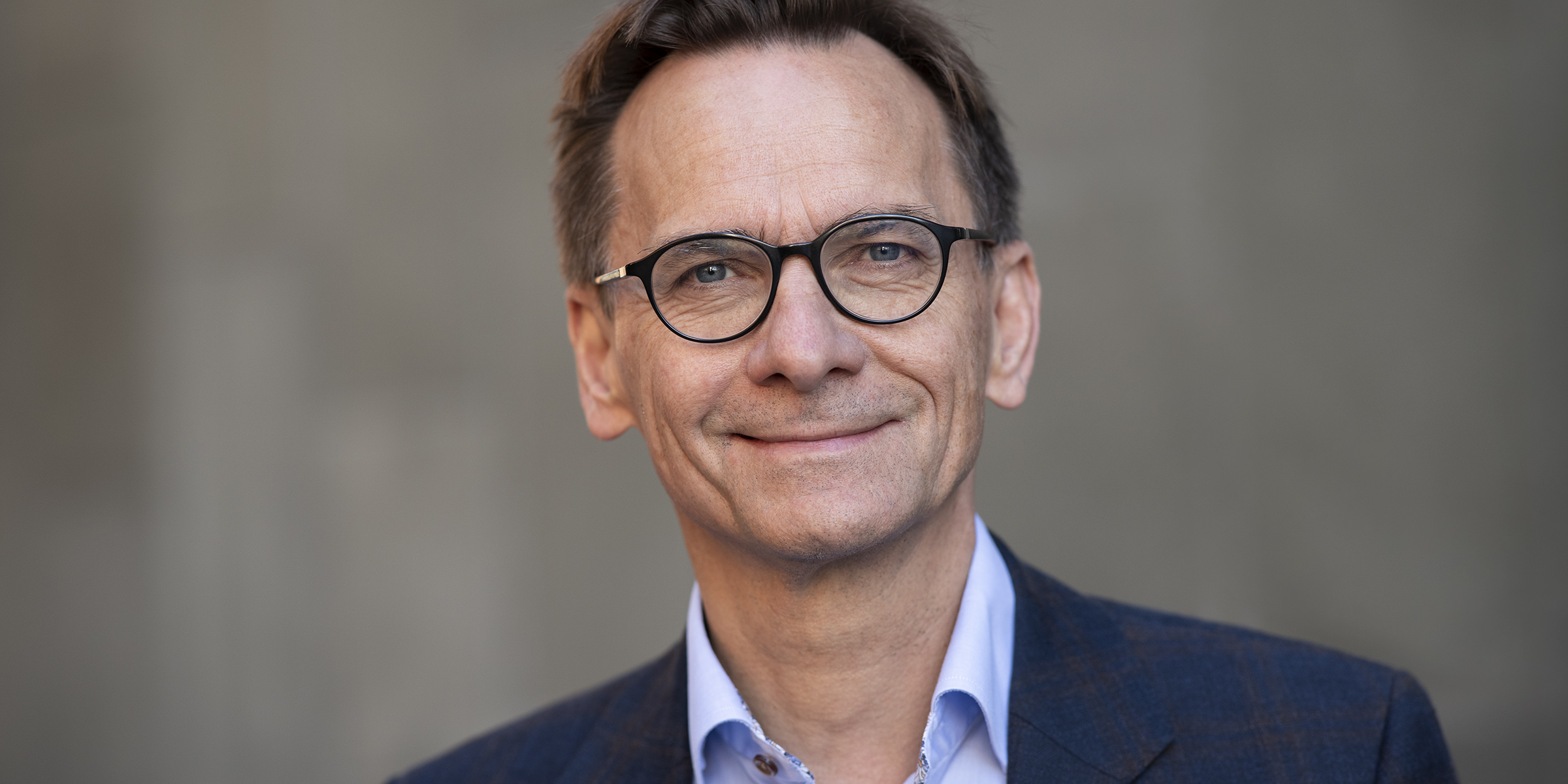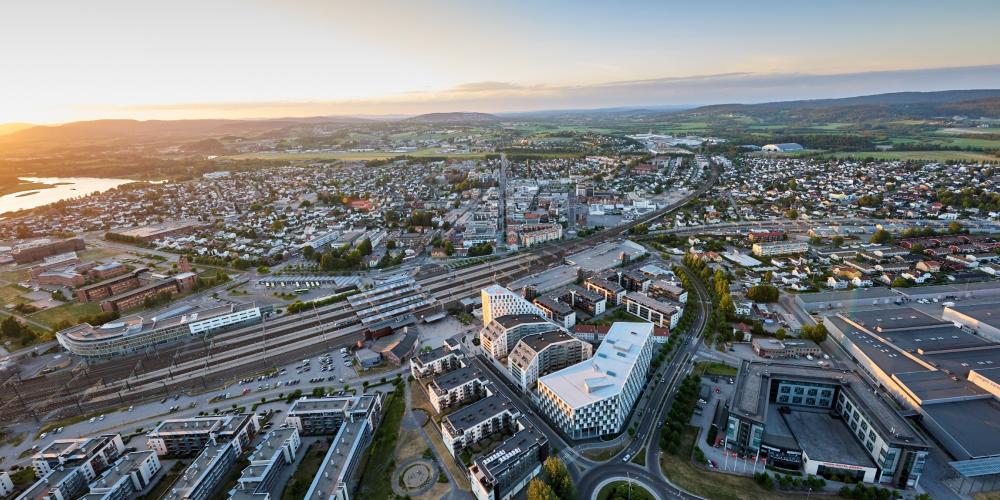
Rector Summarizes the start of the semester
Rector here summarizes activities, work, and impressions from the beginning of the autumn semester.
Dear colleagues,
It has been one and a half months since the start of the semester. It feels like a long time ago, but let me still say that the welcome at Sankt Hanshaugen was a powerful experience. Thousands of our new students braved rain and bad weather to mark the beginning of their academic journey, and the Norwegian band TØFL provided an energetically memorable performance at the student concert later in the evening.
Earlier in the day, I had the opportunity to attend the orientation events with four different student groups: Bachelor in Economics and Administration, and Master of Economics at the Faculty of Social Sciences, Nursing in Kjeller at the Faculty of Health Sciences, Primary School Teacher 1-7 at the Faculty of Education and International Studies, and the four bachelor programs at the Department of Information Technology at the Faculty of Technology, Art, and Design. Meeting new students is always a delight.
The day after, our new Minister for Research and Higher Education, Sandra Borch, paid us a visit. It had only been a few days since she assumed office, and we had to make the most of her limited time with us. She received a quick introduction to OsloMet and our societal mandate, exemplified by a visit to new teacher education students, as well as a demonstration of one of our quantum computers. TV2 was there to document the event, and together with the new leader of the student parliament, Henriette Bøe, I had the opportunity to emphasize the importance of ensuring favourable conditions for our students. In our area, the cost of living is so high that most students work, and if they work too much, it affects both their learning outcomes and attrition rates.
Later that same week, I made a brief visit to Arendalsuka and participated in a debate on research in, for, and with municipalities organized by the Norwegian Association of Local and Regional Authorities (KS). We educate professionals for many of the professions municipalities are responsible for, while our academic communities are actively engaged in research on relevant topics. As usual, OsloMet was well-represented at Arendalsuka. I would like to particularly highlight the significant contributions made by our Faculty of Social Sciences, Arts, and Humanities (SVA) in disseminating their knowledge, thus underscoring OsloMet as an institution that generates essential knowledge for society.
The following week, we had the kick-off event at Rockefeller with hundreds of colleagues in festive attire. There were many happy faces, but the widest smile of the evening belonged to Marko Stojiljkovic from the Department of Nursing and Health Promotion, who won the award for best teacher.
Board Work
Starting this semester, I am serving as a deputy member of the board for the Universities Norway (UHR). This provides an excellent opportunity for engagement with the rest of our sector and contributing to the formulation of UHR's policies.
This semester, our new university board is also in place. In early September, we gathered them for a brief introduction to board work in the higher education sector and a discussion about OsloMet's role in society. The university management team, deans, and center directors also participated. In my introduction, I highlighted various perspectives on OsloMet. We are:
- A modern university with a long history
- A university committed to gender equality
- A professional university
- A first-generation university
- An urban university
- A welfare society university
- A research university
- A university in our region, in Norway, and in the world
- and much more
OsloMet is a large and complex organization that carries out significant tasks for society related to both education and research. Describing us comprehensively without being too general can be challenging. Together, these perspectives illustrate what kind of university OsloMet has been, is, and can become.
Academic development and collaboration
In September, the government launched its initiative on artificial intelligence, an initiative I have had views on how it should be applied for the benefit of Norway. My input led to a debate, as it should be. It is through the exchange of strong arguments that issues are best illuminated. It will be interesting to see if any of the debated points are considered as the initiative takes its final form.
Since the start of the semester, OsloMet has responded to several inquiries, including those regarding the Research Council of Norway's role in the research system, industry-oriented research and development (R&D), and most recently, the initiative to include more children and youth in education, employment, and community life. The latter is not entirely complete yet, but our new Pro-Rector for Research and Development, Tanja Storsul, is actively coordinating our input. Related to this, during a recent leadership meeting, we agreed to initiate an internal focus on children, youth, and inclusion. Given our history and academic activity, we are well-positioned to contribute significantly to a targeted societal mission in this area. Multiple faculties and centers will contribute to our internal focus, which will be funded with strategic resources.
Carl Thodesen, our new Pro-Rector for Social Impact and Collaboration, has coordinated the input on industry-oriented research. Along with Marianne Aasen, who joined us just before the summer, he has been very active. In the past few months, we have established no fewer than five collaboration agreements with five municipalities, including Oslo, Lillestrøm, Rælingen, Ullensaker, and Nes, with more in the pipeline.
Some may wonder what these collaboration agreements entail. The agreement with Oslo municipality is a continuation of an agreement we have had for a while through the Unikom project. The agreements with the other municipalities provide a framework for future collaboration and outline some of the activities that may be beneficial for both us and them. These activities could include working with the municipalities to recruit students to our programs, improving access to internships for our students, establishing university-affiliated childcare centers/schools/companies, offering continuing education and further training opportunities to the municipalities, collaborating on R&D projects, and establishing public sector PhDs, among others. We are clear that we do not have the capacity to do everything for everyone, but we should aim to do something for everyone within some of our areas of expertise. These agreements are intentions of collaboration, to be replaced by formal collaboration agreements when we have concrete activities in place. For the Romerike region, these agreements are particularly important in developing our activities for the new campus in Lillestrøm.
Campus development
Speaking of campuses, we have made progress in the concept choice study for the new campus in Romerike. During the board meeting on September 20, four different main concepts were presented. These concepts will now be assessed from a socio-economic perspective compared to the so-called baseline scenario, which is how Kjeller is today. The concept choice study will be presented to the board in early 2024.
Work on the specific academic content of the new campus in Lillestrøm city center will only commence once the concept choice study has been completed and approved by the board. At that point, we will also have approved our new strategy and made progress in developing an overall plan for our physical facilities in both Oslo and Romerike.
Politics
The upcoming period is important and interesting for our sector. Several policy messages are on the horizon, including the profession report. The state budget will be presented on October 6, and in addition to providing our financial framework for 2024, it will also include details on the new funding system for universities and colleges. We already have some knowledge, as the main principles were introduced with the "Utsynsmeldingen" in the spring. For example, the government intends to abolish incentives for the so-called closed framework (publication points, EU incentives, etc.) and simplify the categories for credit-based funding. However, most of the details remain unclear until they are revealed in the state budget.
As a university, we must consider how or whether we continue the practice of incentivizing research with financial means, as has been done by the Ministry of Education and Research in the past. The Faculty of Social Sciences, Arts, and Humanities (SVA) recently organized a seminar discussing the research indicator. The speakers included Gunnar Sivertsen and our Pro-Rector for Research and Development, Tanja Storsul, both of whom have been central figures in the publication committee.
It's important to note that even though there is a lot of discussion about the funding model now, it will not take effect until 2025. Therefore, we have plenty of time to carefully examine the details and determine the structure of our own budget allocation model. However, some principles already appear clear. For example:
- Research is at least as important as before.
- Our internal distribution model should provide a solid foundation for both education and research at the university.
- There should be sustainable conditions for both research council projects and EU projects.
- The low recruitment to the teaching profession has been a topic in the public debate in recent months.
This week, it was announced that Sølvi Mausethagen, our Vice Dean for Research and Development at the Faculty of Education and International Studies, will lead an expert group established by the government to examine the framework for shaping teacher education programs at universities and colleges.
The last week in September, I attended the annual Nordic Rectors' Conference held in Iceland. This time, the Baltic countries were also represented. While the systems in the Nordic countries are diverse, there are also many common features, and it's always interesting to view the Norwegian framework from a broader perspective. A recurring theme this year was international collaboration in an uncertain world. One of the highlights was a keynote by Professor Gunhild Hoogensen Gjørv from UiT, who discussed the case of the man now suspected to be a colonel in the KGB and a spy. In the current era, some of the fundamental values of universities, such as openness and sharing of knowledge, are challenged by an increasingly complex international security landscape. It's important that this is discussed. Or, in Gjørv's words: We must use democracy to strengthen democracy.
I'll conclude there, with geopolitics and the role of universities. OsloMet is a Norwegian university with strong international connections and many internationally-based staff members. That will continue. September is almost over, and next week, some will have autumn break while others will work. I wish everyone a good October, and I would like to remind you to reserve the lunch break on October 11. We will be holding an input meeting on the nearly completed strategy at that time.










